This will probably be required reading
01/28/10 10:30 Filed in: search
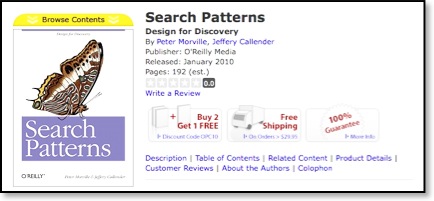
I downloaded it as an iPod app for 4.99. The index doesn't work on the ipod, but I bet it does on the Kindle edition. There are no page numbers, and the subheads are blue link-looking text, so I would bet that Peter Morville understands that indexes must be alive. I hate reading on a teeny screen, but for 4.99, heck, that's a deal.
Will books ever disappear - survey
01/27/10 10:27 Filed in: books
From the
Library Research Service
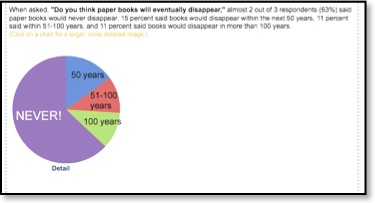
They also asked about what libraries will be circulating in the future...
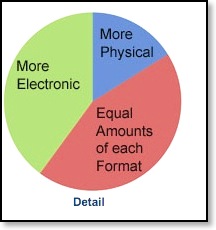

They also asked about what libraries will be circulating in the future...

A little quiz for the publishing world
01/26/10 10:26 Filed in: publishing
From Sarah
at the New Sleekness:
1. Warner Bros. : Netflix as Random House : _______
a. library
b. Amazon
c. GooglePrint
d. all of the above
2. DVDs : movielovers as ebooks : _______.
a. booklovers
b. cheap people
c. misunderstood
d. all of the above
Read on about the mistakes publishers are making in their ebook assumptions... and to see what Sarah thinks the answers are.
1. Warner Bros. : Netflix as Random House : _______
a. library
b. Amazon
c. GooglePrint
d. all of the above
2. DVDs : movielovers as ebooks : _______.
a. booklovers
b. cheap people
c. misunderstood
d. all of the above
Read on about the mistakes publishers are making in their ebook assumptions... and to see what Sarah thinks the answers are.
The known universe
01/24/10 10:23 Filed in: miscellany
This is a
beautiful movie, go watch!
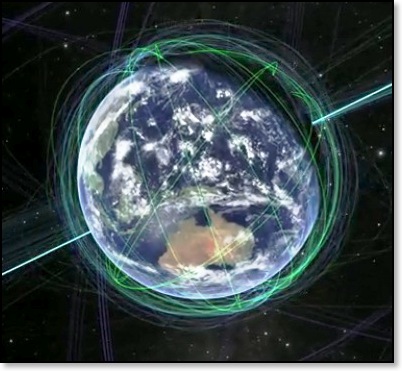
The magic of this film, though, happens as the inky black expands. Pulling farther and farther from Earth, you see the deep blue of the Pacific give way to night as the Sun comes into focus, the orbits of the solar system shrink smaller and smaller, the constellations Sagittarius and Scorpio stretch and distort, and, as the Milky Way receeds, the spidery structure of millions of other galaxies come into view. Then, you reach the limit of the observable universe, the afterglow of the Big Bang. This light has taken more than 13.7 billion years to reach our planet, and you return, back to Earth, to two lakes that are nestled between Mount Kailash and Mount Gurla Mandhata in the Himalayas.

The magic of this film, though, happens as the inky black expands. Pulling farther and farther from Earth, you see the deep blue of the Pacific give way to night as the Sun comes into focus, the orbits of the solar system shrink smaller and smaller, the constellations Sagittarius and Scorpio stretch and distort, and, as the Milky Way receeds, the spidery structure of millions of other galaxies come into view. Then, you reach the limit of the observable universe, the afterglow of the Big Bang. This light has taken more than 13.7 billion years to reach our planet, and you return, back to Earth, to two lakes that are nestled between Mount Kailash and Mount Gurla Mandhata in the Himalayas.
Menial?
01/19/10 10:22 Filed in: indexing
From
MacWorld, Feb. 2010, p. 69, a review of a software
package called Pagehand:
Pagehand 1.0.6 has an elegant user interface that word processor rivals can't touch. The program's beauty is closely tied to its ease of use, but is also aristocratic in nature. The application is not meant for such menial tasks as creating indexes and outlines.
I feel somewhat peeved by this language, don't you?
Pagehand 1.0.6 has an elegant user interface that word processor rivals can't touch. The program's beauty is closely tied to its ease of use, but is also aristocratic in nature. The application is not meant for such menial tasks as creating indexes and outlines.
I feel somewhat peeved by this language, don't you?
Why to keep your books
01/18/10 10:21 Filed in: books
Margaret Atwood has several
good reasons, including:
If you’ve saved up some paper books, you can read them by candlelight, and then toast marshmallows on them if you don’t like them. As you huddle around the embers of your carefully-guarded fire, with no television, no computer, and no phone, you’ll be glad you kept a few. Anyway, they make good insulation.
I have a cold north wall insulated entirely with books. I wonder if we can measure the R factor in some way.
If you’ve saved up some paper books, you can read them by candlelight, and then toast marshmallows on them if you don’t like them. As you huddle around the embers of your carefully-guarded fire, with no television, no computer, and no phone, you’ll be glad you kept a few. Anyway, they make good insulation.
I have a cold north wall insulated entirely with books. I wonder if we can measure the R factor in some way.
I love being ahead of the curve
01/17/10 10:19 Filed in: miscellany

I bought my EZee Sprint bike about 4 years ago - it's a bike with an electric motor and battery, and a throttle. Vroom vroom! When you hit a hill, turn on the throttle, work a bit, switch to a lower gear, and don't kill yourself. Downhill, turn off the throttle and just go with it. On the flat lands, work a bit, and then when you want a rest, throttle up and zoom past the people you are with!
So now, everybody's looking at electric bikes:
TECHNOLOGY has eliminated many of life’s milder physical demands, like getting off the couch to change the channel, or going to the store to buy a book.
The latest exertion to be conquered: biking uphill.
Electric bicycles — a regular pedal-driven bike with a motor for steeper slopes and an optional extra boost — is an idea that has been around for more than a century. But while e-bikes have caught on in certain parts of the world, particularly China, where tens of millions are sold each year, they have never quite captured the imagination of auto-obsessed Americans.
That may be about to change. At the Consumer Electronics Show in Las Vegas this month, Sanyo, the Japanese electronics maker and a major producer of car batteries, showed off a sleek, lightweight e-bike called the Eneloop Hybrid Bicycle.
There's more.....
Best and worst jobs 2010 from the WSJ
01/16/10 10:17 Filed in: miscellany
This is a
fascinating survey. I wonder why anthropologists are
higher up than archaeologists, for instance. And tech
writers are up high, librarians make it to the first
25%. Nursing seems to be way down on the list.
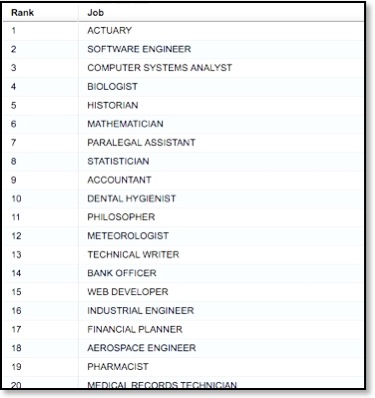
Go browse the list at the Wall Street Journal

Go browse the list at the Wall Street Journal
How much information do we take in daily?
01/15/10 10:14 Filed in: reading
From the
Good Is Good blog:
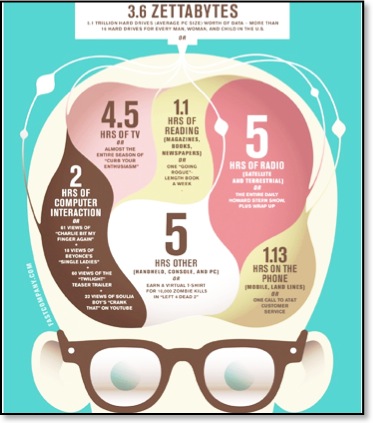
This is per DAY! No wonder my brain hurts!
According to research from the University of California at San Diego—which has been transformed into this awesome accompanying graphic illustration by the artist Rob Vargas for Fast Company—Americans consume 3.6 zettabytes (one zettabyte is one billion trillion bytes) per day. Zounds.

This is per DAY! No wonder my brain hurts!
According to research from the University of California at San Diego—which has been transformed into this awesome accompanying graphic illustration by the artist Rob Vargas for Fast Company—Americans consume 3.6 zettabytes (one zettabyte is one billion trillion bytes) per day. Zounds.
The future of publishing, and how do we reach the authors?
01/14/10 10:12 Filed in: publishing
| ebooks
There are
lots of next-decade projections, but I think Mark Coker is right about some
of this:
1. 95% of all reading will be on screens
2. There will be fewer bookstores, though books will be more plentiful than ever before.
3. The entire book supply chain from author to customer will become atomized into its component bits. Value-adders will continue to find great success in publishing. Dinosaurs, leeches and parasites will be flushed out of new publishing ecosystems faster than ever before.
4. Most authors will be indie authors
5. Successful publishing companies will be those that put the most total profit in the author's pocket. No, not the highest per-unit royalty percentage
I don't know about the screen percentage, but I think 2 and 3 and 4 will have to come to pass. 5, I don't know about. Watching my sis-in-law try to market her books (and she has had 17 published, so it's not like she's new to this) and watching the industry just not work any more in the traditional way means that she is going to have to become Indie to survive. I don't know how many other authors are waking up to the same realization.
So, indexers, do we start marketing to authors? How do you reach Indie authors?
1. 95% of all reading will be on screens
2. There will be fewer bookstores, though books will be more plentiful than ever before.
3. The entire book supply chain from author to customer will become atomized into its component bits. Value-adders will continue to find great success in publishing. Dinosaurs, leeches and parasites will be flushed out of new publishing ecosystems faster than ever before.
4. Most authors will be indie authors
5. Successful publishing companies will be those that put the most total profit in the author's pocket. No, not the highest per-unit royalty percentage
I don't know about the screen percentage, but I think 2 and 3 and 4 will have to come to pass. 5, I don't know about. Watching my sis-in-law try to market her books (and she has had 17 published, so it's not like she's new to this) and watching the industry just not work any more in the traditional way means that she is going to have to become Indie to survive. I don't know how many other authors are waking up to the same realization.
So, indexers, do we start marketing to authors? How do you reach Indie authors?
Working at home - in a feminist view
01/13/10 10:11 Filed in: indexers
Virginia
Heffernan in the NYT:
I had a revelation recently: a woman’s place is not in the home; it’s from the home!...
Telecommuting is a familiar story, but I must sing its praises again — this time in a feminist key. For a century and a half, Mary Wollstonecraft types have tried to empower women to leave the home to work, shop, teach, learn, lead. Instead, without even marking the moment, we superempowered the home. Now if a woman stays home she’s not unambitious or antifeminist; she is — in the acronym of mothering message boards — a WAHM, a work-at-home mom, the most treasured of all the mom options (stay at home = bored; work outside the home = exhausted). This is good news. With technology that allows the WAHM to be simultaneously inside and outside, at home and at work, public and private, she no longer has to forfeit the manly rewards of grasping careerism....
And then there’s what you’re missing by skipping the office: the trafficky commute, the petroleum-based slacks by Theory or Banana Republic, the noli-me-tangere demeanor that women were supposed to cultivate to ensure boardroom authority. All of these duties vanish when workplace and homeplace become one.
And who doesn’t like being at home? Taking uncontested showers at noon. Creating sardine-driven lunches forbidden in cubicle zones. Making nice with clients where no one can overhear your fakeness. And all the while — thanks to the untraceable nature of cellphones and e-mail — you get to pretend that you’re anywhere but on your mangy floor wearing “yoga” pants with “Judge Judy” on mute.
I had a revelation recently: a woman’s place is not in the home; it’s from the home!...
Telecommuting is a familiar story, but I must sing its praises again — this time in a feminist key. For a century and a half, Mary Wollstonecraft types have tried to empower women to leave the home to work, shop, teach, learn, lead. Instead, without even marking the moment, we superempowered the home. Now if a woman stays home she’s not unambitious or antifeminist; she is — in the acronym of mothering message boards — a WAHM, a work-at-home mom, the most treasured of all the mom options (stay at home = bored; work outside the home = exhausted). This is good news. With technology that allows the WAHM to be simultaneously inside and outside, at home and at work, public and private, she no longer has to forfeit the manly rewards of grasping careerism....
And then there’s what you’re missing by skipping the office: the trafficky commute, the petroleum-based slacks by Theory or Banana Republic, the noli-me-tangere demeanor that women were supposed to cultivate to ensure boardroom authority. All of these duties vanish when workplace and homeplace become one.
And who doesn’t like being at home? Taking uncontested showers at noon. Creating sardine-driven lunches forbidden in cubicle zones. Making nice with clients where no one can overhear your fakeness. And all the while — thanks to the untraceable nature of cellphones and e-mail — you get to pretend that you’re anywhere but on your mangy floor wearing “yoga” pants with “Judge Judy” on mute.
Fabulous paper art
01/12/10 10:09 Filed in: books
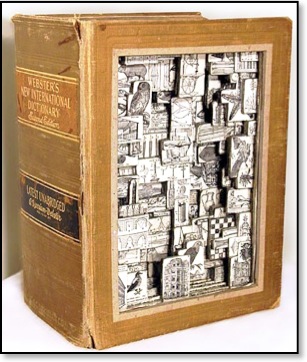
99 works of art in paper, just fantastic: This one is by Brian Dettmer, and is in his series of Book Autopsies.
Eat Your Books indexes cookbooks!
Tip of the
hat to Devon Thomas for this one:
Eat Your Books Indexes Cookbooks
Web site hopes to make cookbooks more useful
By Lynn Andriani -- Publishers Weekly, 1/4/2010 9:23:00 AM
As cookbooks come up against increasing competition from online recipe repositories, Web sites have sprung up attempting to reinvigorate the medium. There’s Cookstr’s database of cookbook content, Cookbooker’s social network for people to rate and review cookbooks, and now, Eat Your Books, a site that purports to make the cookbooks you already own more useful to you. Because there’s nothing worse than having a shelf full of cookbooks but no way of knowing instantly whether or not they contain a recipe for beef stew.
Eat Your Books is based on the idea that it’s easier to search the Internet for recipes than your own cookbooks, so it searches your cookbooks for you. Once you’ve added cookbooks to your virtual shelf on Eat Your Books, you can search through them by recipe name, type (e.g., chili, frozen desserts, soups), ingredient, occasion, ethnicity—in other words, many of the criteria that an online recipe site provides. The more cookbooks you’ve added to your bookshelf, the more recipes there are available to you, and there’s no limit to how many cookbooks you can put on your shelf. Eat Your Books doesn’t actually post recipes, but it does catalog every recipe in a given cookbook, and will give you the ingredient list. So far, the site has 16,112 cookbooks and 195,233 recipes indexed.
Brilliant idea to make indexing pay for itself!
Eat Your Books Indexes Cookbooks
Web site hopes to make cookbooks more useful
By Lynn Andriani -- Publishers Weekly, 1/4/2010 9:23:00 AM
As cookbooks come up against increasing competition from online recipe repositories, Web sites have sprung up attempting to reinvigorate the medium. There’s Cookstr’s database of cookbook content, Cookbooker’s social network for people to rate and review cookbooks, and now, Eat Your Books, a site that purports to make the cookbooks you already own more useful to you. Because there’s nothing worse than having a shelf full of cookbooks but no way of knowing instantly whether or not they contain a recipe for beef stew.
Eat Your Books is based on the idea that it’s easier to search the Internet for recipes than your own cookbooks, so it searches your cookbooks for you. Once you’ve added cookbooks to your virtual shelf on Eat Your Books, you can search through them by recipe name, type (e.g., chili, frozen desserts, soups), ingredient, occasion, ethnicity—in other words, many of the criteria that an online recipe site provides. The more cookbooks you’ve added to your bookshelf, the more recipes there are available to you, and there’s no limit to how many cookbooks you can put on your shelf. Eat Your Books doesn’t actually post recipes, but it does catalog every recipe in a given cookbook, and will give you the ingredient list. So far, the site has 16,112 cookbooks and 195,233 recipes indexed.
Brilliant idea to make indexing pay for itself!
Vooks!
01/08/10 10:05 Filed in: books
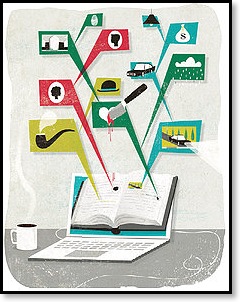
The mysterious man looks completely wrong to me.
In the text of conspiracy thriller "Embassy," an online novel by Richard Doetsch, the character is described as "a starkly thin fellow with a protruding Adam's apple." My brain goes: Alan Rickman!
But when I click on the chapter's accompanying video, the man is younger, tanner, scruffier. He's dressed like he should be bumming clove cigarettes at a concert, not spying on the Greek Embassy.
What I'm reading is a Vook -- a video/book hybrid produced in part by Simon & Schuster's Atria Books. Interspersed throughout the text are videos and links that supplement the narrative. In one chapter, the Greek ambassador receives a mysterious DVD, and readers must click on an embedded video to learn what's on it. In another, kidnapper Jack ominously tells his hostage that he's going to prove that he means business.
Monica Hess explores Vooks at the NYTimes
Mike Shatzkin's predictions for next year in publishing
01/06/10 10:03 Filed in: ebooks | publishing
Read the
whole thing here
It is customary for those of us who do crystal-ball gazing to make some calls about the year ahead at around the time the celebrants head for Times Square. I am not a man to flout custom. Here are some of the things I expect we’ll see in 2010.
1. At least one major book will have several different enhanced ebook editions. This will result from a combination of circumstances: the different capabilities of ebook hardware and reader platforms, the desire of publishers and authors to justify print-like prices for ebooks, the sheer ability of authors and their fans to do new things electronically, and the dawning awareness that there are at least two distinctly different ebook markets: one just wants to read the print book on an electronic screen and the other wants links and videos and other enhancements that really change the print book experience. (Corrolary prediction: the idea of an enhanced ebook that is only sold “temporarily” in the first window when the book comes out, which has been floated by at least one publisher, will be short-lived. Whatever is made for sale in electronic form will remain available approximately forever. Or, put another way, if you have a product that requires no inventory investment that has a market, you’ll keep satisfying it.)...
4. Ebooks will require a new industry directory (and it won’t be printed.) Driven by new entrants in the field, self-publishing, and unbundled aggregations of print books, the gap between the items listed in “Books in Print” and the items that should be listed in a directory of “Ebooks Available” will continue to grow. There has been a robust conversation in a corner of the book community about whether all ebook editions need ISBNs, but that’s really only one part of a much larger metadata problem. In 2010 we are likely to see at least one serious effort to deliver a new online directory for ebooks.
6. Ebooks become significant revenue contributors for many titles. By the end of 2010, ebook sales will routinely constitute at least 20% of the units moved for midlist and the lower tier of bestsellers and at least 10% of the units for really big bestsellers. (These are predictions for narrative writing; illustrated books and kids’ picture books will lag considerably.)
7. Circumstances will outrun the ebook “windowing” strategy. By the end of 2010, the experiment with “windowing” ebooks — withholding them from release when the hardcover comes out — will end as increasing evidence persuades publishers and agents that ebook sales (at any price) spur print book sales (at any price), not cannibalize or discourage them and, furthermore, that this withholding effort does nothing to restrain Amazon’s proclivity for discounting. (Amazon can’t quit with so many competitors joining them; see number 11 below.) There will also be steadily increasing evidence that most readers distinctly prefer either digital books or paper for their narrative reading and the real minority is the people who routinely read both.
There's a lot more, go read him!
It is customary for those of us who do crystal-ball gazing to make some calls about the year ahead at around the time the celebrants head for Times Square. I am not a man to flout custom. Here are some of the things I expect we’ll see in 2010.
1. At least one major book will have several different enhanced ebook editions. This will result from a combination of circumstances: the different capabilities of ebook hardware and reader platforms, the desire of publishers and authors to justify print-like prices for ebooks, the sheer ability of authors and their fans to do new things electronically, and the dawning awareness that there are at least two distinctly different ebook markets: one just wants to read the print book on an electronic screen and the other wants links and videos and other enhancements that really change the print book experience. (Corrolary prediction: the idea of an enhanced ebook that is only sold “temporarily” in the first window when the book comes out, which has been floated by at least one publisher, will be short-lived. Whatever is made for sale in electronic form will remain available approximately forever. Or, put another way, if you have a product that requires no inventory investment that has a market, you’ll keep satisfying it.)...
4. Ebooks will require a new industry directory (and it won’t be printed.) Driven by new entrants in the field, self-publishing, and unbundled aggregations of print books, the gap between the items listed in “Books in Print” and the items that should be listed in a directory of “Ebooks Available” will continue to grow. There has been a robust conversation in a corner of the book community about whether all ebook editions need ISBNs, but that’s really only one part of a much larger metadata problem. In 2010 we are likely to see at least one serious effort to deliver a new online directory for ebooks.
6. Ebooks become significant revenue contributors for many titles. By the end of 2010, ebook sales will routinely constitute at least 20% of the units moved for midlist and the lower tier of bestsellers and at least 10% of the units for really big bestsellers. (These are predictions for narrative writing; illustrated books and kids’ picture books will lag considerably.)
7. Circumstances will outrun the ebook “windowing” strategy. By the end of 2010, the experiment with “windowing” ebooks — withholding them from release when the hardcover comes out — will end as increasing evidence persuades publishers and agents that ebook sales (at any price) spur print book sales (at any price), not cannibalize or discourage them and, furthermore, that this withholding effort does nothing to restrain Amazon’s proclivity for discounting. (Amazon can’t quit with so many competitors joining them; see number 11 below.) There will also be steadily increasing evidence that most readers distinctly prefer either digital books or paper for their narrative reading and the real minority is the people who routinely read both.
There's a lot more, go read him!
Hazel Bell's Indexing in the '60s, ff
01/05/10 10:00 Filed in: indexers
I had the
pleasure of seeing Hazel Bell's new DVD at the ANZSI
conference, and I highly recommend it. It's a
wonderful history, and nicely put together by Aidan
Bell, and would be a great item for a chapter
program. And there is a song included - The Indexer's
Lament!
You can read more about it here.
r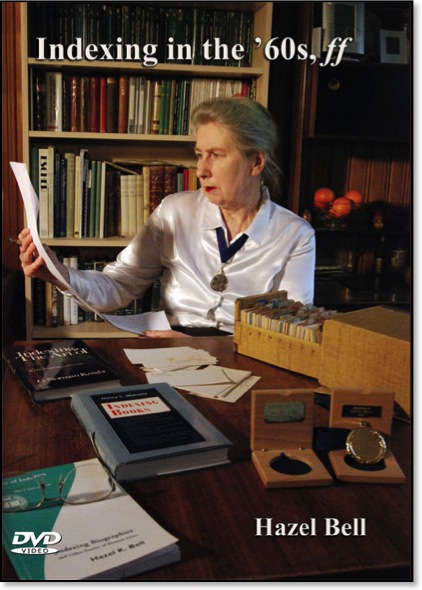
You can read more about it here.
r

Kindles and publishers - will they get it together?
01/03/10 09:59 Filed in: ebooks
From the
Washington Post
Readers want books that are plentiful and cheap, publishers want to preserve their profit, and authors want a larger share of revenue. The conflict has created a strident internecine battle inside the publishing industry. At issue are the price and timing of e-books, and who owns the rights to backlist titles. While publishers, agents and Amazon.com bicker, there is little time for conceiving new content that satisfies customer demand. If the book business doesn't tune in to that demand, it could wind up as a transitional source for the e-readers.
We know that readers want content, because it's clear they're not dazzled by the device. Consumers have made Amazon's limited and rudimentary device a hit, which speaks to their desire for books that are cheaper and easier to obtain. It surely isn't the device's design or functionality. Both are closer to the computer aesthetic of the 1980s than today's digital world. The Kindle may have lots of titles available -- but good luck using the device to decide what to read next.
But publishers have ignored this demand. In response, several conglomerates have aggressively moved to protect their legacy. Macmillan recently announced a plan to delay the publication of e-books and offer enhancements that will justify a higher price. This tactic is aimed at Amazon's policy of trying to set $9.99 as the expected price for an e-book. Most are priced much higher -- but that's beside the point. Amazon and publishers are fighting over this fiction, not the reality. Because Amazon's customers have made it clear that $9.99 is still too high for their taste. Most titles in the company's list of top 100 Kindle bestsellers are priced below $9.99, and the most popular price point is $0.00. But publishers can't hear this, because they're a little distracted right now.
Readers want books that are plentiful and cheap, publishers want to preserve their profit, and authors want a larger share of revenue. The conflict has created a strident internecine battle inside the publishing industry. At issue are the price and timing of e-books, and who owns the rights to backlist titles. While publishers, agents and Amazon.com bicker, there is little time for conceiving new content that satisfies customer demand. If the book business doesn't tune in to that demand, it could wind up as a transitional source for the e-readers.
We know that readers want content, because it's clear they're not dazzled by the device. Consumers have made Amazon's limited and rudimentary device a hit, which speaks to their desire for books that are cheaper and easier to obtain. It surely isn't the device's design or functionality. Both are closer to the computer aesthetic of the 1980s than today's digital world. The Kindle may have lots of titles available -- but good luck using the device to decide what to read next.
But publishers have ignored this demand. In response, several conglomerates have aggressively moved to protect their legacy. Macmillan recently announced a plan to delay the publication of e-books and offer enhancements that will justify a higher price. This tactic is aimed at Amazon's policy of trying to set $9.99 as the expected price for an e-book. Most are priced much higher -- but that's beside the point. Amazon and publishers are fighting over this fiction, not the reality. Because Amazon's customers have made it clear that $9.99 is still too high for their taste. Most titles in the company's list of top 100 Kindle bestsellers are priced below $9.99, and the most popular price point is $0.00. But publishers can't hear this, because they're a little distracted right now.